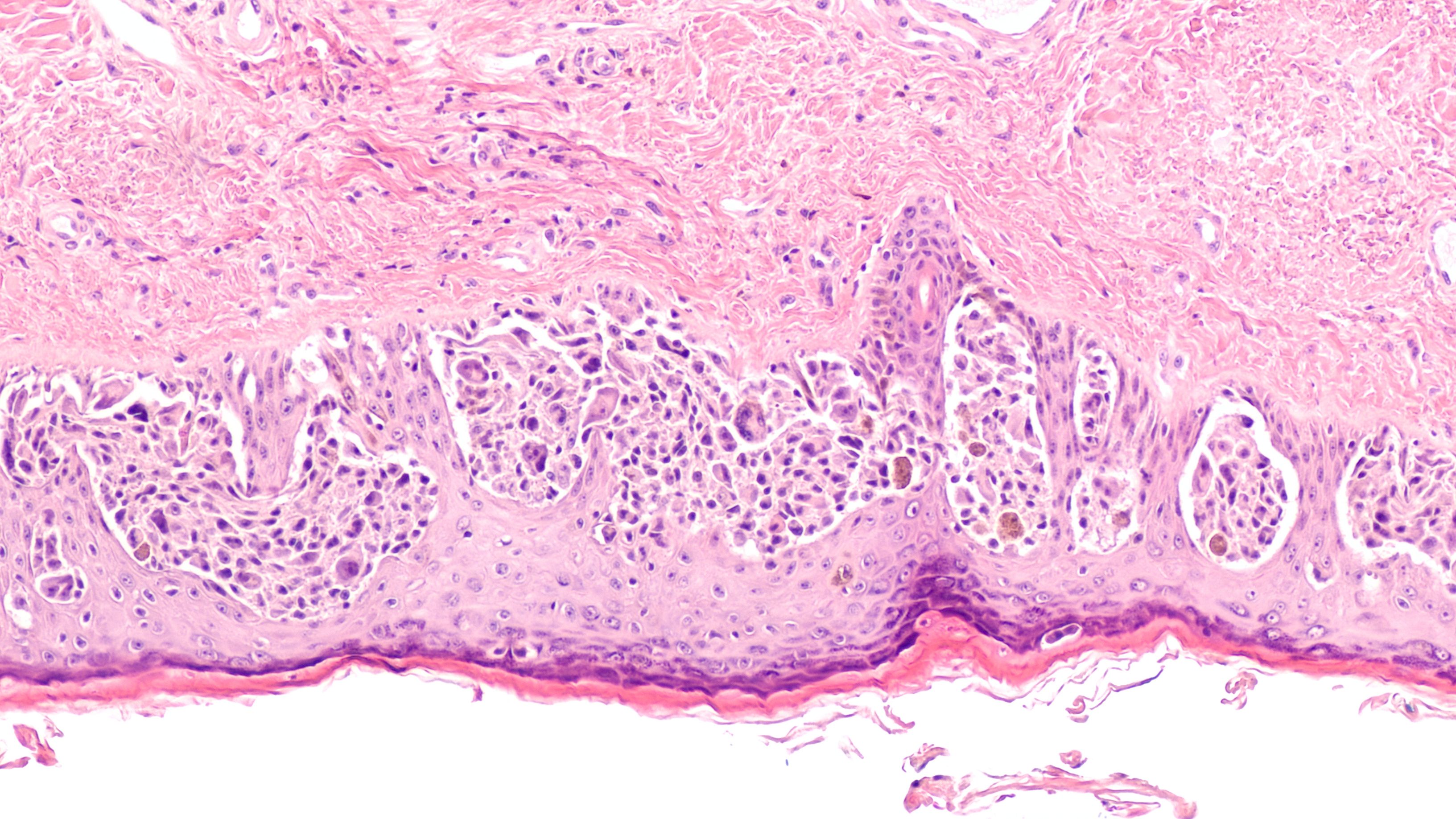Global Phase 3 Trial Investigates mRNA Vaccine for Melanoma Treatment
Jeff Yorio, MD, discussed the unmet needs among patients with melanoma and plans for a phase 3 study assessing an mRNA vaccine.
Image of melanoma cells: © David A Litman - stock.adobe.com

A global phase 3 clinical trial is planning to evaluate an mRNA vaccine for the treatment of patients with high-risk melanoma that have already undergone surgery. The treatment combines an individualized neoantigen therapy (V940) and pembrolizumab (Keytruda).
V940 is designed to target a patient’s specific tumor mutations and boost the immune system’s ability to fight cancer cells.Early trials suggested that V940 plus pembrolizumab may be more effective than pembrolizumab alone in reducing the risk of melanoma recurrence or death. This phase 3 trial aims to confirm these findings in a larger cohort of approximately 1089 patients.
The study’s primary end point is recurrence-free survival, and secondary end points include distant metastasis-free survival, overall survival, and safety. The trial is recruiting patients at more than 165 sites in over 25 countries, including 2 Texas Oncology centers in Austin and Dallas.
Jeff Yorio, MD, medical oncologist and central Texas research leader for Texas Oncology, discussed the unmet needs in this patient group and plans for this phase 3 study in an interview with Targeted OncologyTM.
Targeted Oncology: What are the unmet needs in this patient population?
Yorio: This study itself is looking at patients who are able to have surgical resection of melanoma but have a real high-risk of recurrence. It is [patients] with higher-risk stage II, stage III melanoma. One of the big issues there is they still have a very high risk that their initial melanoma can spread to other places and come back. One of our interests is always trying to lower their risk of this happening, because once it has the ability to spread, then their survival rate, things like that, start to go down dramatically.
There are some therapies available, immunotherapy drugs like [pembrolizumab] which is a drug that is used on this trial as well. But we can always do better, and we can always try to improve upon those results. That’s the goal of a trial like this, to see if we can lower the risk of recurrence and therefore hopefully save more lives in the end.
Has there been research done on cancer or specifically mRNA vaccines in this space?
Yes. For this vaccine, there was already a phase 2 trial that was done that did show an improvement by adding the vaccine to [pembrolizumab]. It lowered recurrence rates in the population from about 40% to somewhere along the range of about 22%. It was a pretty drastic decrease in recurrence. That was a phase 2 study, so it is a much smaller study. The whole point of doing this much bigger phase 3 trial is to validate those type of results and hopefully, by doing that, get more accuracy that it can go on and lead to actual approval of this type of medicine.
What are the end points of this phase 3 study?
This trial is looking at does adding the mRNA vaccine, this personalized vaccine, decrease the risk of recurrence of melanoma for these patients? Hopefully, by doing that, it also improves the long-term survival rate of patients with this disease.
What place do you see cancer vaccines having in the future of cancer treatment?
I think it is exciting technology. In the past, we had some vaccines that had been studied, [but] they were not very specific, [and] they were not as personalized. The cool thing about this vaccine is it is personalized to each patient, because they are making a vaccine based on that patient's cancer. I think the chance for success is a lot higher by doing that, because it is kind of a personalized immunotherapy, getting [the patient’s] own immune system to really target what is going on with that particular patient's melanoma. It is already happening that [researchers] are already looking at this in other cancers as well colon cancer. There was a little bit of excitement about whether this could be possible in pancreatic cancer. There are other cancers that this is certainly being looked at as well.
What makes melanoma 1 of the easy [cancer types] to go after is melanoma tends to be very immunogenic. Cancer immunotherapy, some element of that, has been around for a long time. More recently, in the last 5 to 10 years, it has taken off and melanoma led the way in a lot of that change and research because it is immunogenic. I think there is promise that that a vaccine like this could work well in melanoma. Then hopefully in some of the other cancers that have some immunogenic component as well, where we are using immunotherapy, I think they might have a good shot down the road. Who knows, can we use vaccines ultimately, as a prevention for patients? And I think that might be a dream, but that's probably down the road to get to that kind of way.










